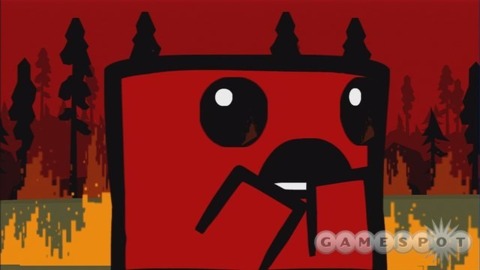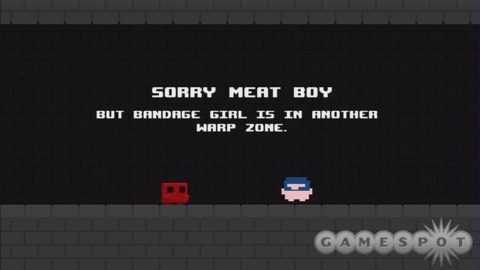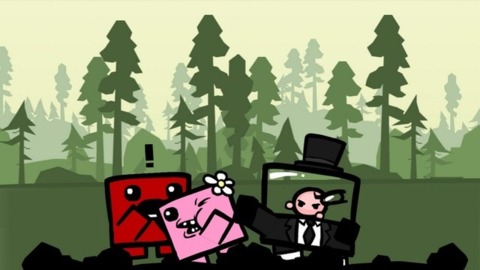Making Super Meat Boy sizzle
Q&A: Team Meat discusses its philosophy of game design, sticking to its guns in the face of focus groups, and why the App Store sucks.
Last month, Super Meat Boy debuted on Xbox Live Arcade, where the hard-as-nails, moist-as-ground-chuck 2D platformer won critical acclaim for precise controls and demanding-yet-doable difficulty. The game was developed by Edmund McMillen and Tommy Refenes--collectively known as Team Meat--who are rapidly gaining a reputation as outspokenly opinionated members of what is already an outspoken and opinionated indie development community.

McMillen and Refenes spoke with GameSpot for a recent feature article compiling designer perspectives on the social gaming trend. However, the interview stepped beyond those parameters early and often. Topics discussed but left out of the feature included the pair's design philosophy, their original goal for Meat Boy, and ignoring outside feedback on the game. Those topics are timely once again as Super Meat Boy debuts on the PC this week, complete with new exclusive playable characters from other indie hits like Minecraft and Machinarium.
GameSpot: Did you expect Super Meat Boy to be greeted by critics and audiences so positively?
Edmund McMillen: We didn't know how Meat Boy would do at all. We had no idea. We thought it would be too difficult, or just not everybody's thing. But it's kind of been released to an insane amount of critical praise. The fans are just great, and the sales are really great. If that's happening with us, I know for a fact that if you just make a good game, put your all into what you're doing, you can still outshine the mainstream money-making guys that can pour s***loads of money into advertising. If you go all-in on what you're working on, there's definitely hope there.
GS: How difficult has it been as independent developers when the channels that have lowered the bar to entry are also overrun with casual and social games?
Tommy Refenes: It's very hard now for someone who wants to make a game to legitimately say, "We're going to spend 18 months on Meat Boy and release it on iPhone." I don't think anybody in their right mind can justify that right now. There are like 30,000 apps, or something like that. There is so much random bull**** that goes into any game doing well on that system. There's a huge amount of luck. There's obviously the press and how people respond to the game.
That Angry Birds game is an exception to the rule. It's a good game and it actually did do well. But I really think a lot of their success is just because they kind of got lucky. They could have come out the same week as some sort of weird farting application that people would just gush over and then everybody would flock to that. It makes it very difficult to compete, and it makes it very difficult to justify spending any sort of large development cycle on making a game for something like the iPhone. There's a very real and very scary chance that your game comes out, some random thing comes out that isn't really a game but makes a lot of people laugh, and all of a sudden your 18 months is now screwed because that one week where you had your whole spotlight is now gone because this one joke fart app that Apple didn't even want on the system is up there and people are buying it.
You can argue the whole "free market" thing, but I think that only works sometimes. It's very, very important to make sure stuff is of a certain quality, and the App Store doesn't do that. They just let anybody and everybody put up whatever they want. They had a boob jiggling application, for f**** sake. Come on. Every prepubescent little 12-year-old boy that has an iPhone is going to buy the f****** boob game, and it's going to go all over the place because that's what it is. And then it's like, our 18 months are now flushed down the toilet; let's go work at ngmoco now. God, I hate the App Store so much.

GS: One of the big trends with social games like Farmville is metrics in design, where you can do things like change the color of a button from purple to green and see how many people click on it as a result, to maximize average revenue per user or virality.
EM: I didn't realize that, but that's business. That's business and not game design, so that makes sense.
TR: That sounds like the most evil f****** s*** I've ever heard in my life.
EM: The funny thing about [metrics] and business in general is the idea that they think they're perfecting something and they're going to be more successful by perfecting it. When in reality, I guarantee you something will come out in the next few years that will beat out these games, and it will be something nobody knows about, and something nobody knows they wanted, because the thing that people really want is something they don't know exists. That's the important thing that business always forgets. People want something new and fresh. They don't know what that thing is. You can fine-tune something to hell, and all you're going to get is a few more thousand people. It's not just about that; once people get tired of something, they get tired of it and move on to something that's new and innovative and fun. And if Minecraft hasn't proved that, I don't know what has.
TR: By that same token, people will accept just awful s***. See the last nine Call of Duty games, or whatever. I'm not saying those are necessarily s***, but they're nothing new. They are exactly what the last one was, maybe with some improvements. Call of Duty is becoming Madden, basically.
EM: It's all business. It's just business, you know?
GS: What sort of metrics did you use in developing Super Meat Boy?
EM: [Laughs] It went as far as me and Tommy going, "Hey, is this good?"
TR: One day I go to Ed and say, "This level's too hard. What are you, silly?"
EM: And then I make it a little easier. Yeah, we had nothing. Our budget is zero, so we didn't have the ability to do much. Microsoft does donate one focus group, and that focus group came back with a lot of funny reactions to a lot of things.
TR: Had we followed [all] that feedback, the game would be dull, boring, and it wouldn't load the game during cutscenes. Instead it would pop up a static image that says "Loading."

EM: It's funny how that works. I guarantee, if we went by what people wanted, there is no way our game would be as popular as it is. Hands down, the game would not be as good, would not feel as honest. This is quite literally me and Tommy talking back and forth and making a game without any real outside influence, and just trying as hard as we can to stay true to what our vision was, which was essentially trying to remake Mario for us. How could we remake Mario perfect for when we were 13-year-old kids so that when we played it, we'd go nuts over it. That was the design. That was it. We just so happened to fall onto something that more people could relate to than just us.
I was kind of surprised that so many people did relate to and enjoy the game, because quite literally, we didn't put much thought at all into marketing and business and who would and wouldn't like it. I know for a fact that a good half of Microsoft, especially the business side, was very confused on how to market this game. I don't know if they thought it would do as well as it did because of the difficulty, because of the way it looked, or because it was strange. On paper, we do not follow any of the proven patterns to make a successful game. As an independent, it's cool to be able to say we did something different, took a risk, stayed true to what we were doing, and did well, in hopes that other people will do the same thing.
GS: So what were the less helpful responses from the focus group?
TR: Literally, like I said about the loading screen. They didn't like that it loaded during the cutscenes. Actually, what they said was they didn't want to watch the cutscenes every time. Well, the cutscenes are totally skippable, but there's a little saw in the corner that spins while it's loading the game (and unskippable). By their feedback, they felt it would be better to basically [let players] skip the cutscene, then show a loading screen. They thought that would be better. It sounds really d***-ish, but not everybody's a game designer. Just like not everybody's a doctor. Just because they think something is exactly what they need, they can't see the scope beyond what's always been presented to them. And what's always been presented to them is you skip a cutscene and then you sit there [at a loading screen].
I remember when PlayStation first came out and everybody b****** about the load time. But people got used to it and stopped seeing it as a nuisance and instead as a necessity. So when we did something different in order to continually engage the player, they said, "I don't want to watch the cutscene." They don't see the difference. They don't see that they are loading a game. They're not watching the cutscene; they're watching a really good loading screen.

EM: We got a lot of feedback saying that the game was too crude, that the humor was not funny. They wanted the humor changed. They thought the game was too hard. That was a universal thing, that the game was too hard. That sort of basic stuff. They weren't too specific on what they wanted to change; it was just an overall reaction that seemed not super-positive. The consensus on paper was that this was going to be a niche game for hardcore gamers only. And it wasn't going to be that well received in reviews because it was too strange and unfamiliar and didn't hold people's hands through things.
There were a lot of things, business-wise, which were and have been very frowned upon. Two of the biggest ones involved money. It was giving away levels for free, which is a big no-no for business. For us, it's more logical that if we gave something free to fans, they would start talking about the game and it would bring more people in than a microtransaction for a few bucks aimed at people who may have forgotten about the game by then.
The second one was of course launching the game on sale. We'd been talking about a sale around Christmas for the game, but it seemed like a s***** thing to do to fans who bought the thing two months earlier for $15 and then suddenly it's $5 cheaper. So why can't we just launch the game on sale? The people who initially buy it are going to be the hardcore people who love the game, so why not reward them? Again, this isn't something business-wise that is smart. This is a risky thing that Microsoft never did. But they were finally like, "Yeah, OK, we'll try it." We don't know how we can prove that this made things better or worse, and we don't really care. All we care about is that we got to take a risk and do something innovative with business. Hopefully the fans appreciate it.
We're just trying to be as logical as we can about this. It just seems fair. We're not greedy people. Tommy and I have been poor for quite a while, and we've been fine. It's not about juicing the fans until they're dry. It's more about making a really awesome game that people like and continually giving back to the community. Business people think that we're stupid, so what are we going to do?

TR: And we think business people are stupid. Honestly, I know a lot of people that got MBAs in my college. No offense if anybody has an MBA, but it's not a CS degree. It's not a doctor's degree. These are the guys who pushed me in college. Like, I thought we were over this s***. Obviously there are exceptions, but the guys I knew were all jerks. And they pushed me and made fun of me in f****** college. Grow up.
EM: They were sorority girls.
TR: Shut up! Yeah, they were. [Laughs]
GS: Back to Super Meat Boy, it's intentionally old school in its design, but there are some more modern approaches there. There's no punishment for death, for example. How did you decide which modern design staples were worth including and which ones improved things?
EM: I just default back to the logical process. We went through games that were fun and tried to pick apart why they were fun and why they weren't. Things have just changed over the years. The rules of games have changed, and the expectations. Another reason we were worried the game might not be well received is because we didn't think people would be ready for something hard again. But it was kind of a reinvention of what difficult means. A lot of people think that punishing games and frustrating games are difficult. But I'd like to try to reinvent that word and make people think that when something's difficult, it's good. Because when you beat something difficult, you feel rewarded. And that's a lot different from playing something that's frustrating and discouraging. A lot of games in the past were very punishing. You'd basically have to start all over again when you made an honest mistake.
I think me and Tommy are both teachers, and our goal is to make sure the class passes the test. I don't think a good teacher would give their kids a test and then be happy that they f***** them all over and they all got Fs. That's a bad teacher. A teacher wants their kids to pass. It's the art of being a good teacher. I want people to understand how to play and feel they did a good job. I want them to feel rewarded for doing well and proud of the fact that they did it themselves. I want to give them the tools that they need in order to feel good about beating the game.
That's the basis of game design for me. I feel like I failed if people are really frustrated by the game, or can't finish it, or hit a wall. That all falls on me, not them. That's me as a designer. I failed. It's just trying to pick things apart logically to try and avoid frustrations: small levels, no respawn times, lack of lives, and just trying to get people to understand how the game plays without holding their hand through the process. You learn more by making mistakes than by having somebody tell you what not to do.
Another Crab's Treasure Is A Soulslike 3D Platformer | GameSpot Review Stellar Blade Review Super Monkey Ball Banana Rumble - Official Multiplayer Features Trailer Nintendo 64 – April 2024 Game Updates – Nintendo Switch Online PUBG | Erangel Classic Returns Gori: Cuddly Carnage | Meow Launch Date Announcement Trailer Genshin Impact - "Arlecchino: Afterglow of Calamity" | Collected Miscellany Marvel Rivals - Official Loki Character Reveal Trailer | The King of Yggsgard Fortnite Festival - Official Billie Eilish Cinematic Season 3 Trailer Remnant 2 - The Forgotten Kingdom | DLC Launch Trailer Stellar Blade - Official "The Journey: Part 2" Behind The Scenes Trailer | PS5 Games Dead by Daylight | Tome 19: Splendor | Reveal Trailer
Please enter your date of birth to view this video
By clicking 'enter', you agree to GameSpot's
Terms of Use and Privacy Policy
Got a news tip or want to contact us directly? Email news@gamespot.com
Join the conversation